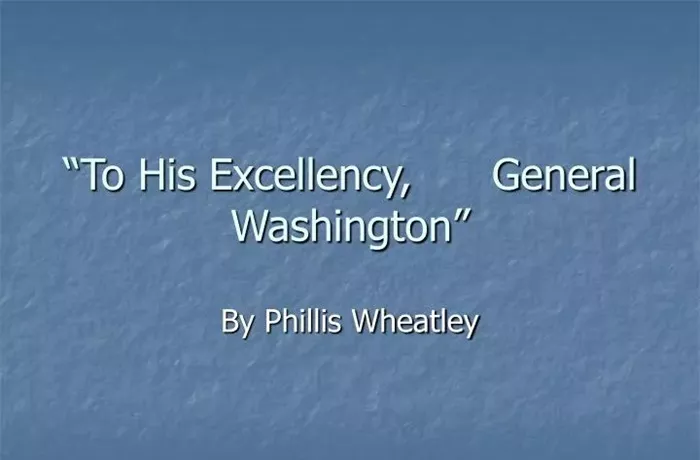Welcome to Poem of the Day – The poem To His Excellency General Washington by Phillis Wheatley.
The poem To His Excellency General Washington by Phillis Wheatley is a tribute to George Washington, offering praise for his leadership and heroism during the American Revolution. Written in 1775, the poem not only highlights Washington’s military achievements but also conveys Wheatley’s admiration for his moral and noble character. This article will explain the meaning and significance of the poem, summarize its content, analyze its structure, and explore its major elements.
To His Excellency General Washington Poem Explanation
In the poem, Wheatley addresses General George Washington directly, praising his military victories and leadership in the American Revolution. She expresses her belief that Washington’s leadership is divinely inspired and that his triumphs have made him a symbol of liberty and freedom. The poem also emphasizes the idea of divine providence guiding Washington’s actions. Wheatley reflects on the glory of Washington’s achievements and encourages him to continue his noble work for the cause of freedom.
Structure and Form
To His Excellency General Washington is written in rhymed couplets, a common structure for poems of the 18th century. A couplet consists of two lines that rhyme and share the same meter. The poem follows a regular iambic pentameter, meaning each line has ten syllables, with the stress pattern alternating between unstressed and stressed syllables. This formal structure gives the poem a rhythmic and elevated tone, suitable for the praise of such an esteemed figure as General Washington.
Detailed Explanation of Major Elements
1. Praise of Washington’s Leadership
Wheatley begins the poem by acknowledging Washington’s role as a leader. She compares him to a hero and a figure of great power. She portrays him as a commander who not only excels in battle but also inspires his soldiers and the people who follow him. This praise reflects Wheatley’s admiration for Washington as a symbol of strength and courage.
2. Divine Providence
A central theme in the poem is the belief that Washington’s success is a result of divine guidance. Wheatley suggests that Washington’s victories are not just the result of his personal skill but also the will of God. This divine connection is emphasized throughout the poem, where Wheatley presents Washington’s military success as part of a greater, divine plan for American independence.
3. Symbol of Liberty
The poem portrays Washington as a symbol of liberty. Wheatley emphasizes that Washington’s efforts are not just about winning battles but about securing freedom for the American people. This connects Washington’s personal achievements to the larger cause of independence and justice, making his leadership even more significant.
4. Anticipation of Victory
Throughout the poem, Wheatley expresses hope and confidence in Washington’s eventual victory over the British forces. She envisions a future where Washington’s leadership ensures the success of the American Revolution. This forward-looking perspective gives the poem an optimistic tone, even though the revolution had not yet reached its conclusion when the poem was written.
5. Classical and Biblical References
Wheatley’s poem is rich in classical and biblical allusions, which were common in the literature of her time. She references figures from mythology and religious texts, using them to elevate Washington’s status. These references help to place Washington’s actions within a larger historical and moral framework, reinforcing the idea that his leadership is divinely sanctioned and worthy of praise.
Conclusion
To His Excellency General Washington is a well-crafted poem that celebrates the leadership and heroism of George Washington during the American Revolution. Phillis Wheatley’s use of formal structure, praise of Washington’s virtues, and belief in divine providence all contribute to the poem’s powerful impact. Through her words, Wheatley immortalizes Washington as a symbol of liberty and freedom, linking his personal success to the larger cause of American independence.

